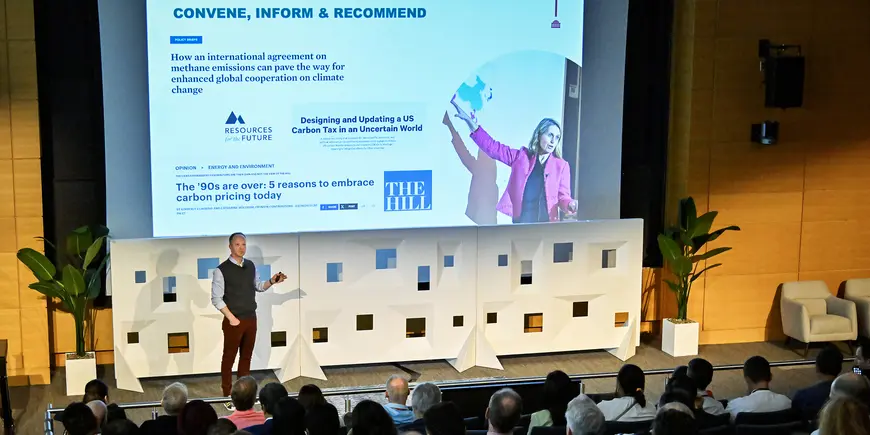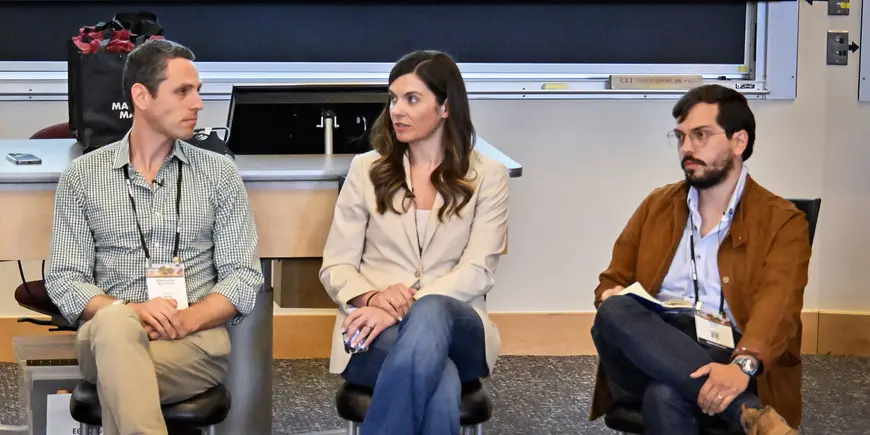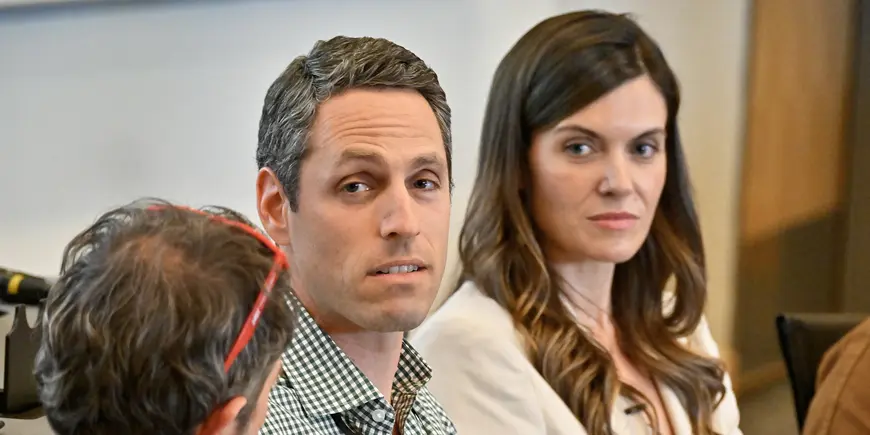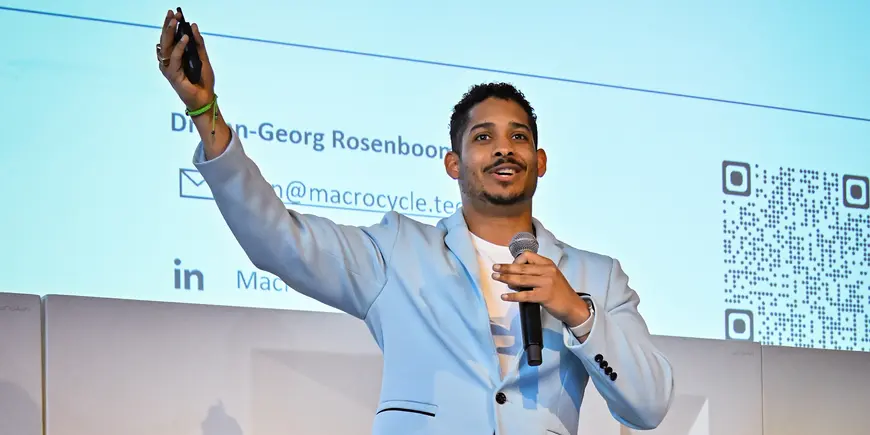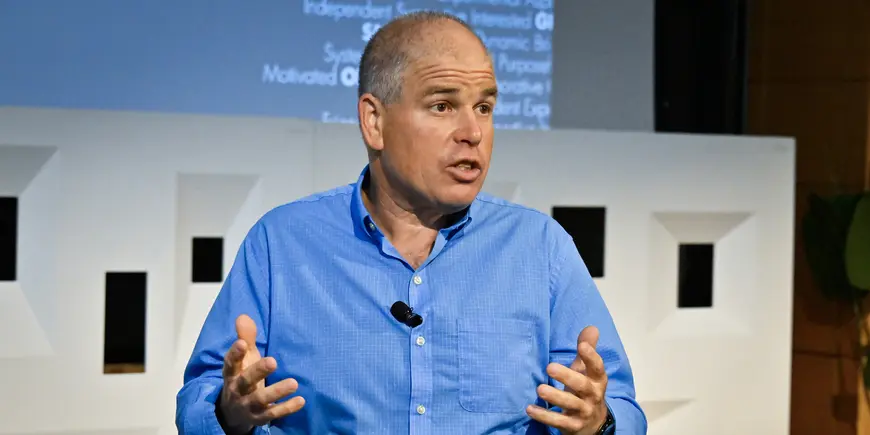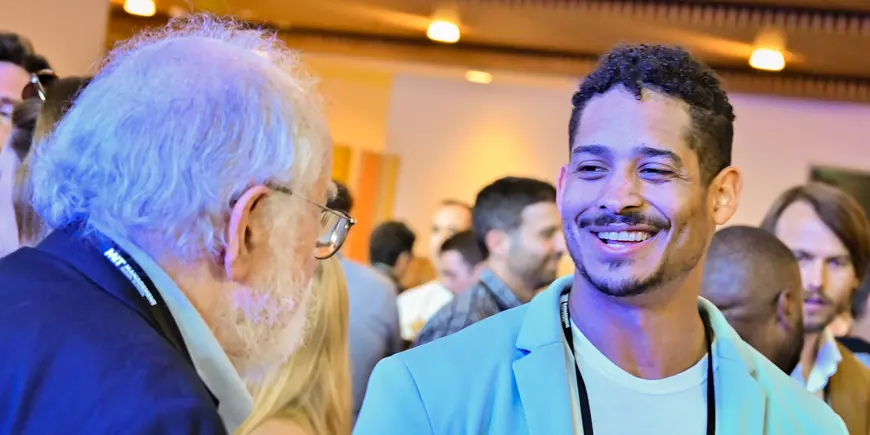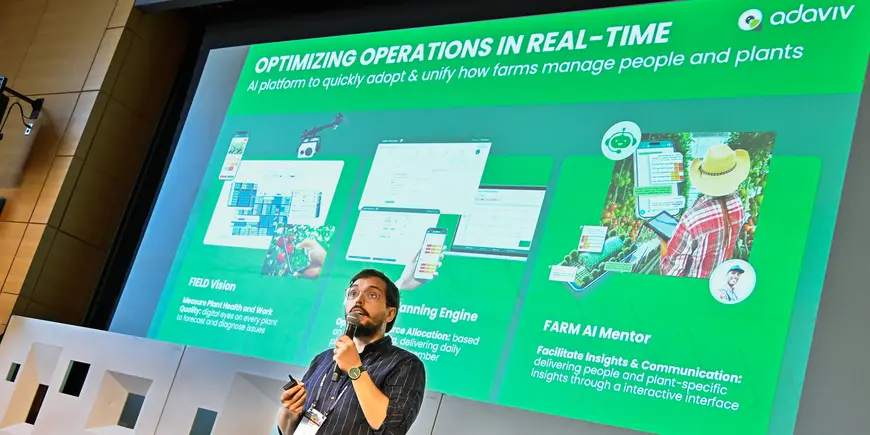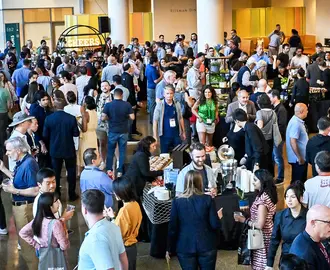During MIT Sloan Reunion 2024, the climate crisis was top of mind. MIT has already been embedded in climate and sustainability research for decades, but ever-increasing needs for innovation, policy, and adoption mean that the Institute’s contributions remain crucial. With that in mind, alumni, administrators, and faculty had the chance to discuss their impact and goals at the reunion.
Pioneering Climate Change Solutions
-
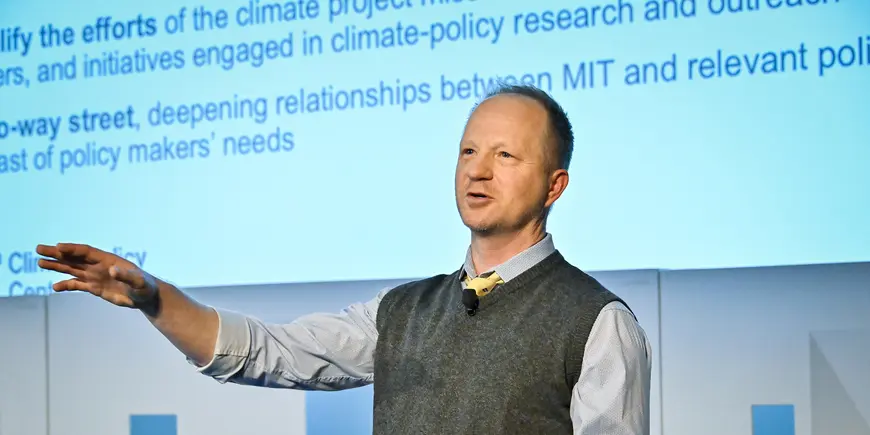
The new MIT Climate Policy Center Christopher Knittel (Associate Dean, Climate; George P. Shultz Professor of Energy Economics) discusses the new MIT Climate Policy Center, where he serves as the inaugural faculty director.
MIT Sloan’s commitment to climate
In March, MIT Sloan announced the launch of the MIT Climate Policy Center, which the school jump-started with a $25 million investment. Its goal is to accelerate university-led innovation by bringing together resources and capabilities to help change the planet’s climate trajectory. Executive Director Bethany Patten, EMBA ’13 (Senior Lecturer), will help lead the center’s efforts along with Faculty Director Christopher Knittel (Associate Dean, Climate; George P. Shultz Professor of Energy Economics) and many others. During a talk at reunion titled “Climate Research at MIT: The Integral Role of MIT Sloan,” Knittel discussed the center’s aims, plans, and projects.
Knittel has done significant work on decarbonization in transportation; he explained that publicizing research—his own and others—to policymakers and turning insights into action has historically been challenging. The center is designed to bridge that gap.
“MIT has one of the best names and the best reputations in climate change research and environmental research with universities, but I do feel as though we’ve been punching below our weight, so to speak, in places like D.C. or Sacramento or the U.N.,” he said. “The main point of the MIT Climate Policy Center is to amplify that impact that we have among policymakers themselves.”
With the MIT Climate Policy Center as the “front door” to connect stakeholders to MIT experts, Knittel added, “We’re going to work with policymakers to analyze legislation, craft new legislation, understand the gaps in legislation—and that’s how this [project] is going to be a two-way street.”
This will also involve cross-connecting work across various parts of the Institute, highlighting experts’ impacts on policy, and allowing for shorter, more flexible timelines for experts to deliver insights that can quickly help policymakers. Citing ongoing research collaborating with the MIT Climate Policy Center—including climate policy that builds revenues, the En-ROADS model, and work on ESG measurement—Knittel added that he and other leaders at the center are working with researchers and alumni on how best to add value.
The main point of the MIT Climate Policy Center is to amplify that impact that we have among policymakers themselves.
Alumni bring climate innovation to their communities and industries
In a talk titled “Alumni Innovators: How MIT Sloan Founders Are Addressing Climate Challenges,” four alumni discussed their work towards sustainability solutions in their own fields.
Alexander Borschow, SB ’06, MBA ’14, is managing partner at venture capital firm Rocana Venture Partners, working in the health and wellness consumer space. For over a decade, he’s learned about deploying resources for maximal sustainability impact. “We saw that consumers were actually one of the most powerful ways to drive change … Every time you go and buy something on Amazon, every time you go and walk into Whole Foods or Kroger or CVS or Wawa, you are voting with your dollar.” He added, “We decided to focus our resources on investing in and partnering with entrepreneurs that are creating consumer brands that have sustainability and consumer health as part of their core mission and purpose.”
Diana Ganz, EMBA ’14, is co-founder of SuitShop, a company that is designed to be a slower fashion alternative in the suit market. Citing that fashion is one of the greatest contributors to climate change, in working with her co-founder she recognized some of the problems inherent in the industry. “You are trying to make predictions on what styles are going to be popular in spring two years from now. Truly, it’s that miscalculation that is the greatest, most wasteful thing in fashion. So, we launched SuitShop with a suit in four different colors and a black tuxedo that we still have today—and it’s still our bestseller,” she said.
Julian Ortiz, MBA ’19, is co-founder and COO of AdaViv, a software company that integrates AI and agriculture to the benefit of productivity, ecosystems, and global food supply. AdaViv is building a “copilot” that assesses and manages crops’ performance for fruit and vegetable farmers—with a drive towards efficiency but also social and environmental impact. “We empower the growers so they can better track productivity for their employees, and dignify their jobs and pay them better, but at the same time save production costs,” he explained. “As we help them to optimize resources, they can minimize how much they lose from pests and diseases.”
Jason Jay, PhD ’10, (Senior Lecturer; Director, MIT Sloan Sustainability Initiative) moderated the talk. He stressed that change needs to happen at every level, all the way up to pricing carbon to unlock capital. “In addition to the innovation and the founding and the cool new startups and technologies, we need to think about systems change [and] policy changes that fundamentally change the rules of the game and unlock these models to work,” he said.
If you want to defend the environment, you can avoid investing in companies that you feel are doing harm to the environment and invest more in companies that you feel are doing good things for the environment.
Burgeoning alumni businesses with a sustainability focus
Elsewhere at Reunion, other climate innovators discussed their ongoing work. In the case of Michael Even, SM ’84, his journey to value-based investing began after he semi-retired after selling his Boston-based investment firm. As part of his goal to make an impact, he helped create FaithInvest, a non-profit based in the United Kingdom that aims to work with religious groups globally to help them invest their assets in a “faith-based” manner.
“If you want to defend the environment, you can avoid investing in companies that you feel are doing harm to the environment and invest more in companies that you feel are doing good things for the environment. I was very interested in that space,” he said, as one of several alumni speakers at the "IM2M Talks: Ideas Made to Matter" showcase on Friday evening.
Stwart Peña Feliz, MBA ’23, was a participant in the 2023 MIT delta v cohort and is co-founder and CEO of sustainable plastics recycler MacroCycle Technologies. As part of the "MIT Sloan Innovation Showcase," affectionately known as "Beaver Tank," on Saturday evening, he spoke about the environmental crisis: 80 percent of globally produced plastic is not recycled, and most mechanical recycles result in a downgraded product that is not fully circular.
Feliz worked with Jan-Georg Rosenboom, postdoctoral fellow at the MIT Langer Laboratory, on scaling plastics-recycling technology to develop a venture that would create circular plastics with zero carbon emissions. Instead of an energy-intensive process of breaking the plastic bonds to the monomer and re-producing the plastic, “we make new [bonds],” he said. “We create a new intermediate that allows us to bypass all the energy-intensive steps to produce a virgin-grade plastic that can be sold at market rate and high profitability.”
The result is the MacroCycle PET pellet, which “requires no green premium for adoption—and it comes with zero carbon emissions,” he explained. The technology can work with plastic waste of any kind, including fibers, and the removed contaminants can be used in their packaging.
MacroCycle is currently undergoing a round of funding in support of commissioning a pilot plant less than a mile from MIT that would have the capacity to upcycle up to 200,000 bottles per year—but Feliz noted that investors and interested parties could reach out to him to scale up this technology even further.
Check out the MIT Sloan Reunion 2024 website to see more highlights and videos.

